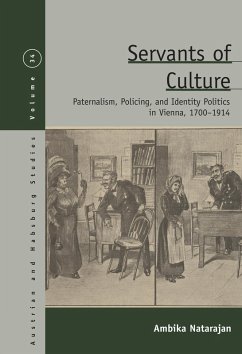In nineteenth century Cisleithanian Austria, poor, working-class women underwent mass migrations from the countryside to urban centers for menial or unskilled labor jobs. Through legal provisions on women's work in the Habsburg Empire, there was an increase in the policing and surveillance of what was previously a gender-neutral career, turning it into one dominated by thousands of female rural migrants. Servants of Culture provides an account of Habsburg servant law since the eighteenth century and uncovers the paternalistic and maternalistic assumptions and anxieties which turned the interest of socio-political players in improving poor living and working conditions into practices that created restrictive gender and class hierarchies. Through pioneering analysis of the agendas of medical experts, police, socialists, feminists, legal reformers, and even serial killers, this volume puts forth a neglected history of the state of domestic service discourse at the turn of the 19th century and how it shaped and continues to shape the surveillance of women.
Dieser Download kann aus rechtlichen Gründen nur mit Rechnungsadresse in A, D ausgeliefert werden.









